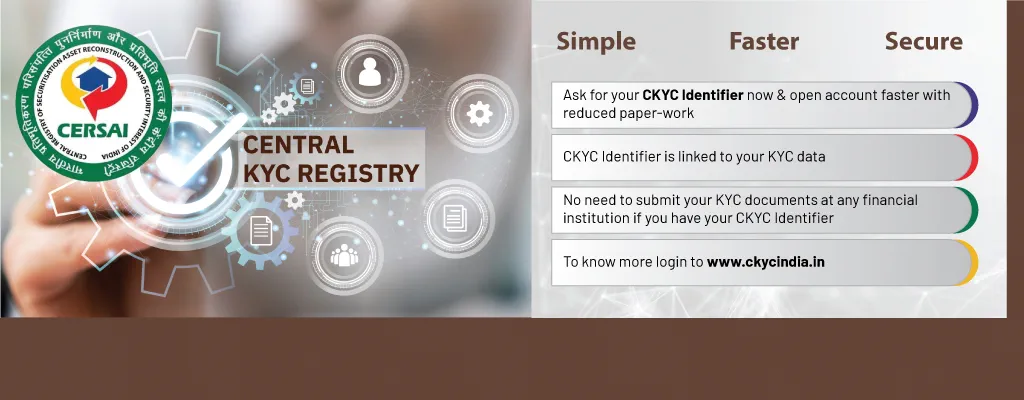Central Know Your Customer (CKYC) is a centralized KYC repository introduced by the Government of India to simplify the KYC process across financial institutions. It eliminates the need to submit KYC documents multiple times for different financial services.

Background of CKYC
Section 73 of the Prevention of Money Laundering Act, 2002, gives the central government the authority to frame various rules and regulations to curb black money. With this authority, the Central Government introduced CKYC to ensure single KYC for individuals looking to buy or invest in financial instruments. The Central Registry of Securitisation Asset Reconstruction and Security Interest (CERSAI) is the governing body that manages the CKYC registry.
What is CKYC?
CKYC, or Central Know Your Customer, is a centralized database of your KYC information across the financial sector with uniform KYC norms. CKYC is created with the intent to reduce the burden of submitting KYC documents for verification when starting a new financial relationship with a new finance company.
CKYC stores the KYC records of customers availing various financial services across institutions, such as insurance companies, banks, NBFCs (Non-Banking Financial Companies), etc. Once you complete the CKYC process, you receive a unique 14-digit CKYC number. This number eliminates the need to submit physical documents for future financial transactions with participating institutions.
Types of CKYC Accounts
- Normal Account: Normal accounts are opened when you submit any of the following six official documents as proof of identity: PAN, Aadhaar, Voter ID, Driving License, Passport, and NREGA Job Card.
- Simplified Measures Account: This type of CKYC account will be opened if you submit other officially valid documents (OVDs) that are allowed as per RBI circular RBI/2015-16/42. The KYC identifier for these accounts will be prefixed by ‘L’.
- Small Account: This type of account is opened when you submit only personal details along with a photograph. The KYC identifier for these accounts would be prefixed with ‘S’.
- OTP Based eKYC Account: This type of account is opened if you submit a photograph along with the Aadhaar PDF file downloaded from the UIDAI website, which is enabled by an OTP. The KYC identifier for these accounts would be prefixed with ‘O’.
Features of CKYC
- CKYC is a 14-digit number linked with the ID proof.
- Customer’s data is safely stored in an electronic format.
- The documents submitted are verified with the issuer.
- All the concerned institutions are notified when there are changes in KYC details.
- CKYC facilitates inter-usability and uniformity of KYC records and processes across the financial sector.
- It facilitates KYC search, download, upload and update.
- It has advanced and secure user authentication mechanisms for system access.
- It facilitates seamless file exchange processes without needing manual intervention.
- The APIs for download and search allow for real-time account opening for CKYC-compliant customers
Documents required for CKYC
- Proof of Identity (POI)
- Proof of Address (POA)
- Passport size photograph
- Signature
Which Institutions can Register Customers for CKYC?
Financial institutions regulated by SEBI, RBI, IRDAI, and PFRDA can register your KYC details with CKYC. When you open a bank account, Demat account, purchase an insurance, or invest in mutual funds, these financial institutions will register your KYC details with CKYC.
How to Complete the CKYC Process?
- Find a participating financial institution: Banks, insurance companies, mutual funds, and other financial institutions registered with CKYC can help you complete the process.
- Submit your documents: Provide required documents like PAN card, Aadhaar card, and proof of address.
- Get verified: The financial institution will verify your documents with the issuing authorities.
- Receive your CKYC number: On successful verification, you will receive a unique 14-digit CKYC number.
FAQs
What is Central KYC Registry?
CERSAI is responsible for storing customer KYC records in one central place. Keeping standardized KYC records in a central database makes it easy for different financial institutions to use the data, making things more convenient for both customers and institutions.
How CKYC Works?
It’s inevitable that you undergo the process of CKYC if you are a stock market or mutual fund investor. When you approach a fund house to invest in, you would first be asked to fill the KYC form and submit the supporting documents. These documents would be sent to CERSAI and you would be allocated with a unique 14 digit CKYC number. If you wish to invest in another mutual fund house, then you would not be required to submit the documents again for verification. The mutual fund house would request CERSAI to furnish your documents by submitting your CKYC number. CKYC makes your process of investing easy and hassle-free.